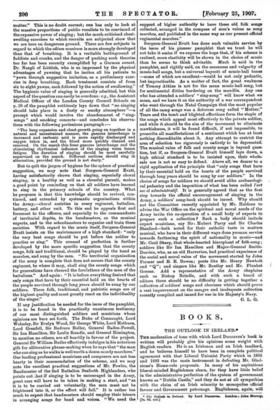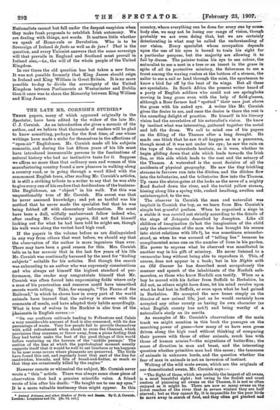BOOKS.
THE OUTLOOK IN IRELAND.* THII moderation of tone with which Lord Dunraven's book is written will probably give his opinions some weight with English readers. He is an Irishman and an Irish landlord, and he believes- himself to have- been in complete political agreement with that Liberal Unionist Party which in 1888 and 1893 was the main instrument in defeating Mr. Glad- stone's Home-rule proposals. In many of his aspirations liberal-minded Englishmen share, for they have little belief in the administrative perfection of the system of government known as "Dublin Caatle," and they do not at all sympathise with the claim of an Irish minority to monopolise official favour and Government patronage. Engliahmen, again, will h The Chttleole .a, Ireland. B7 Lord Dnoremon. London: Joan Nanny. [7s. 6d. not.]
cordially echo his wish that Irishmen of different classes and creeds would soberly and peacefully betake themselves to the consideration of Irish affairs. No one, in England at all events, seriously questions Lord Dunraven's loyalty or patriotism, or earnest desire to bring about a sense of common citizenship amongst Irishmen and Englishmen. Yet from the beginning to the end of his book there is hardly a chapter in which he does not either shut his eyes to palpable facts, or at least regard them through some distorting medium of national prejudice, with the result that however well intended his advice, it will scarcely commend itself to those who have given calm consideration to the Irish problem.
We have said that the Liberal Unionists were a principal factor in the maintenance of that Parliamentary Union which Mr. Gladstone's proposal to establish a separate Irish Parlia- ment would have destroyed. But, in truth, the facts of the case, and the conditions of our modern civilisation, are far stronger causes than the opinion of politicians for securing us against any permanent retrogression to the system of two Parliaments, finally put an end to by the Union of 1801. Lord Dunraven thinks that there is something altogether repugnant to ordinary British theory and practice in denying to Ireland such a Constitution as has been freely and wisely granted to British Colonies. What is the use of directing our eyes to the Channel Islands, or the Isle of Man P Is there any similarity whatever between these cases and that of Ireland In the Colonies the Constitutions established have been built upon facts. It may please Lord Dunraven to see in the Constitu- tions of the Dominion of Canada and the Commonwealth of Australia illustrations of "the great principle of devolution" ; and to assert that to the Canadian and Australian Parliaments the Imperial Parliament has delegated its authority (p. 205). The fact is that the Imperial Parliament has parted with its authority, and that the power and authority of the Dominion and Commonwealth Parliaments are now derived from those who have elected them, the citizens of our "Sister Nations." In these days of democracy national English-speaking Parlia- ments aim at sovereignty. In the great British Colonies the Constitution has followed the facts. The Parliaments representing those great democracies became Sovereigns de facto, and the Imperial Parliament, recognising facts, has virtually crowned them by making them Sovereigns de jure as well.
It is lamentable that, after the complete exposure of the impossibilities of Gladstonian Home-rule, the present Prime Minister and Irish Secretary should still hold up the re. establishment of a national Parliament in Dublin as the ideal at which Liberal statesmanship should aim. So much the worse for the prospects of British Liberalism ! Bnt Lord Dunraven, as we understand him, certainly does not share the wish of the Liberal leader in its completeness. His present proposal is a less far-reaching one. In the blessed word "Devolution" he finds salvation. He would not, indeed, "set bounds to the march of a people" (p. 258) ; but he tells us that Irishmen- before they can walk must be taught to stand, when they have learnt to walk they must be taught to march, and when this lesson has been acquired no bounds are to restrain them. Yet Lord Dunraven in another place states plainly that " these narrow seas cannot contain two independent States ; and Great Britain is perfectly justified in safeguarding herself." Well; but if this is so, a very rigid limit is put to the march of a people. It is forbidden to march to independence. We cannot say that Lord Dunraven is herein any wiser than Gladstonian Home-rulers who would in the name of Irish nationality set up an Irish Parliament and Government in Dublin, and confidently expect them to remain duly " subordinate " to the Parliament and Government at Westminster !
Lord Dunraven pursues the ordinary Irish method of seeking reform. Where Ireland is unprosperons and poor, it is entirely the fault of her connexion with England. It is English misgovernment that keeps Irish wages low, that forces Irishmen to better their fortunes by crossing the seas, and that drives an ever-increasing percentage of the population into lunatic asylums. It is her avarice that grinds down Irishmen with unjust taxation. As compared with Scotland, great is the expense of Irish civil establishments. Irishmen are• longing to economise, but British influence and extravagance prevail over Irish virtue ! If only a body of Irish rePresenta- Jives in Dublin could be substituted for the hated Treasury, salaries would be reduced, officials dismissed, and the reign of economy would begin.
Lord Bum-even writes as if Irishmen were as little under stood in England as the natives of the South Sea Islands. And he flourishes statistics to prove that Irishmen are the most sober, the most orderly, and the least criminal of the population of the United Kingdom. The Irish birth-rate per thousand of the population is as much below that of Great Britain as is the Eritish birth-rate below that of Roumania. All this is very interesting, and merits examination. A Briton may perhaps think that in the consumption of liquor and in the perpetration of crime, on this side of the Irish Channel, his own efforts are materially assisted by his genial visitors from the Sister Isle ; whereas in Ireland itself, either in drinking or fighting, the Englishman hardly gets a look in !
In spite of Lord Dunraven, it must be said that the Act of Union expressly contemplated the arrival of a time when the two countries would contribute indiscriminately to the expen- diture of the United Kingdom " by equal taxes imposed on the same articles in each" (Art. I.) Lord Dunraven does not tell the whole story of the present relation of Englishmen and Irishmen to the Imperial tax-gatherer. According to the Report of the Financial Relations Commission of 1895, the. inhabitants of Ireland pay £1 8s. 10d. per head, whilst the inhabitants of Great Britain pay no lees than £2 4s. 10d. per head. What a terrible outcry there would be from Ireland were these figures reversed! It is quite true that if Ireland be supposed to be that which it is not, a "financial entity," then, inasmuch as the Spirit and Tea and Tobacco Duties are pro- portionately a greater source of the revenue in Ireland than they are in England, an inequality in favour of England canbe shown. In the same way, it would be perfectly easy to imagine that certain English districts constituted a " financial entity," and accordingly paid more than their "taxable capacity" warranted. But when we clear our minds from these abstrac- tions and entities, and contemplate the concrete flesh.and- blood Irishman side by side with his British brother, it must be admitted that the former comes off uncommonly well.
All the taxes that the Irishman pays the Englishman pays also, and several others in addition, as, for instance, the House-tax, from which Irishmen are exempt Lord Dunraven would like to see Irishmen exempted also from Income-tax. Yet even if we grant that very poor Irishmen pay heavily on spirits and beer and tobacco, how would they be relieved by their comparatively well-to-do countrymen escaping the tax upon incomes P
Now, having got at Lord Dunraven's point of view and general principles, let us see what are his proposals. There is a good deal of vagueness about them, and be is very earnest in assuring us that he does not go further than did Lord Hartington and Mr. Chamberlain in 1886. He would establish in Dublin a Financial Council of twenty-four, half nominated by the Crown, and half popularly elected, presided over by the Lord-Lieutenant, by which body the Irish Estimates would be prepared in order to be laid before Parliament. The plan appears to be to assign for a series of years a fixed income to Ireland, which it would be the duty of the Council to administer. A statutory body, consisting of Irish Peers, Irish Members of Parliament, and members of the Financial Council, is to sit in Dublin to exercise functions which have not yet been defined. In their present vagueness it is hardly worth while to consider these proposals. We are unaware of what is intended as to the very essentials of the scheme. Is the body representing the Irish people to control the Irish Executive or not P Whose orders will the Constabulary and the Police Force obey P We must remember what is the claim of Irish Nationalists, and that even English statesmen are encouraging Irishmentolook for the virtual independence of the Colonial system. We do not doubt Lord Dunraven's sincerity. His political creed, he tells us, "is clear and simple." One "Parliament is my centre ; its ultimate effective supremacy is my circumference ; but emanating from that centre and within that circumscribing limit I desire to see the largest possible freedom of action and self-governing power delegated to Ireland" (p. 265). We agree that the late Government was in a better position than the present one to give effect to Lord Dunraven's aspirations, supposing them to be capable of realisation. Those who were ready to destroy the effective supremacy of Parliament a few years ago at the bidding of Irish
Nationalists cannot but fall under the deepest suspicion when they make fresh proposals to establish Irish autonomy. We are dealing with things, not words. It matters little whether we speak of Home-rule or Devolution. Who is to be Sovereign of Ireland de facto as well as de jure ? That is the question, and every Unionist answers that the same sovereign will that prevails in England and Scotland must prevail in Ireland also,—tin., the will of the whole people of the United Kingdom.
In our times the old question has but taken a new form. It was not possible formerly that King James should reign in Ireland and King William in Great Britain. It is no more possible to-day to divide the sovereignty of the United Kingdom between Parliaments at Westminster and Dublin than it once was to share the Monarchy between King William and King James.












































 Previous page
Previous page